USDA hints at more limits on custom slaughterhouses
Published on September 14, 2021
USDA’s Food Safety & Inspection Service (FSIS) has an advisory committee – the National Advisory Committee on Meat and Poultry Inspection (NACMPI) – that is heavily tilted towards Big Meat. Concerningly, FSIS has asked the committee to provide recommendations on several aspects of custom exempt slaughterhouses.
We need your help to push for good recommendations that support small farmers and consumers who want to know where their food comes from!
 As a reminder, custom exempt slaughterhouses are regulated and inspected by the government under federal law, but they are not required to have an inspector on-site at all times, and they have reduced paperwork burdens. Meat processed in a custom slaughterhouse can only be provided back to the person(s) who owned the animal when it was processed.
As a reminder, custom exempt slaughterhouses are regulated and inspected by the government under federal law, but they are not required to have an inspector on-site at all times, and they have reduced paperwork burdens. Meat processed in a custom slaughterhouse can only be provided back to the person(s) who owned the animal when it was processed.
These custom slaughterhouses primarily process meat for hunters and homesteaders. They also process animals that are co-owned by multiple people under “cow shares,” where each person owns a half or quarter of the animal. But that can be hard to arrange since few people want to buy that much meat at one time because of the cost or the space needed for storage.
In the last two years, three states – Wyoming, Colorado, and Nebraska – have adopted laws that make it easier for farmers and consumers to work with custom slaughterhouses. All three laws have a variation on “animal shares” or “herd shares” that allow individuals to buy less than a quarter of a cow at a time, and still be recognized as a co-owner when it comes to getting the meat after processing.
All of these laws fit within the current USDA regulations because those regulations do not limit the number of co-owners of an animal. But one of the questions that FSIS is asking the Advisory Committee is whether it should adopt a new rule “to set a numerical limit on the number of individuals allowed to co-own an animal presented for slaughter/processing under the custom exemption provision.” The agency is also asking if it should adopt rules to prevent people from organizing into membership groups to jointly own animals.
If the agency were to do that, it would block the Wyoming, Colorado, and Nebraska laws – and prevent other states from adopting similar laws. This is going in the WRONG direction!
We want the agency to go in the other direction: Take steps to support access to small-scale slaughterhouses, including custom exempt slaughterhouses. You can read the recommendation FARFA submitted earlier this summer to USDA (scroll to page 3 of the pdf for the discussion on custom slaughterhouses).
TAKE ACTION
We are looking for people who have personal experience with custom exempt slaughterhouses (whether as livestock producers or consumers) to take action. If you don’t have that experience, just stay tuned – there will be future actions for you.
Please submit a short comment to the Advisory Committee setting out your experience with custom exempt slaughterhouses. After you’ve shared your experience, urge them to take the following steps:
- Do not recommend numerical limits on the number of individuals who can co-own an animal;
- Do not recommend preventing people from organizing into membership groups to jointly own animals;
- Do recommend that the agency respect people’s right to own whatever portion of an animal they choose and that the agency remove its current policy that requires the custom exempt slaughterhouse to be the entity that divides the meat into shares. The co-owners can properly handle this themselves.
Submit your comments to the Advisory Committee through the online portal. The deadline is September 24.
Please save a copy of your comments! If the Advisory Committee issues bad recommendations, we will ask you to send a copy of your comments to the USDA and to your Congressional delegation.
You can also register to provide oral comments during the Advisory Committee’s virtual meeting on September 27. Your comments will be limited to 3 minutes, and we encourage you to sign up only if you have very specific information to share. (The Committee will not pay much attention to comments that are general. In other words, it needs to be more than just “we want you to support custom slaughterhouses.”)
Thank you for taking action!